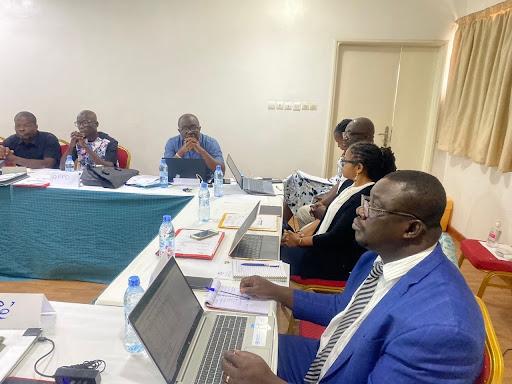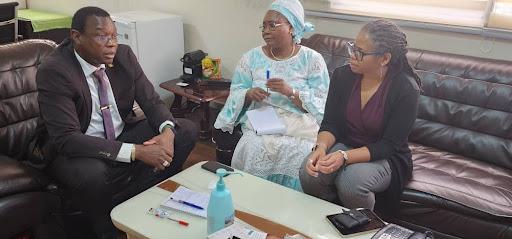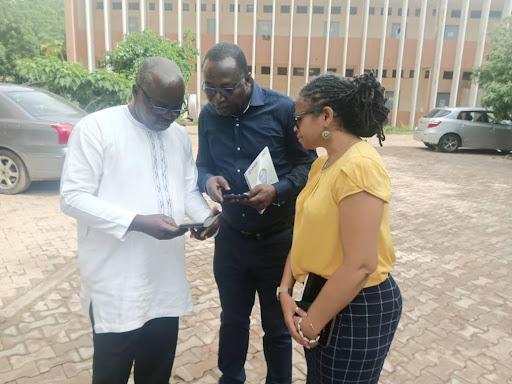For CHISU Deputy Director Dr. Stephanie Watson-Grant, who recently traveled to several countries where the program works, the opportunity to visit country teams is “absolutely invaluable.” This is partly because she’s able to spend so much time with each CHISU expert (which she said equates to a year’s worth of being online), but also because she can better understand their context and the work they’re doing.
“Being able to talk through things, to hear the explanation and really have a conversation about the work that’s happening—I just always appreciate that,” she said.

Watson-Grant began her most recent trip in Côte d’Ivoire, where she participated in CHISU Resident Advisor Dr. Rahim Kebe’s introduction to a number of stakeholders in the country. Kebe has transitioned from his role as resident advisor of the Burkina Faso team to resident advisor in Côte d’Ivoire.
One of the meetings Watson-Grant participated in was with Côte d’Ivoire’s National Malaria Control Program (NMCP). CHISU is already providing support to the NMCP, but this meeting was an opportunity for Kebe to hear about the program’s most immediate needs. Watson-Grant also met with the USAID President’s Malaria Initiative (PMI) team to introduce Kebe. During the meeting, the PMI health director described his team’s vision for CHISU’s support in Côte d’Ivoire—namely to use all of the different funding sources CHISU has available—to strengthen the overall health information system in the country.
Watson-Grant also gave opening remarks at a malaria scorecard and dashboard training in Yamoussoukro. This training targeted four districts in Côte d’Ivoire and introduced the concept of scorecards and dashboards—and in particular, the malaria scorecard and dashboard that were developed by PMI Measure Malaria for monitoring malaria interventions across the country.
Watson-Grant highlighted the size and diversity of CHISU’s portfolio in Côte d’Ivoire—and the fact that the country is poised for success in its HIS strengthening efforts. “The big takeaways for me from Côte d’Ivoire are going to be ensuring that expectations are met and that we have a story to tell about HIS progression,” Watson-Grant said.

On another stop during the trip, Watson-Grant visited Mali, where she met with the Ministry of Health (MOH) cabinet, Mali’s NMCP, the Bamako regional health team, Keneya Sinsi Wale (an implementing partner), Digital Square, DGSP, INSP, and the One Health coordinating group.
Data quality was a big focus of the conversation in many of these meetings. For example, NMCP discussed how supervision is necessary to address data quality issues at different levels (including the community level). This data quality focus validates CHISU’s work plan in Mali. CHISU is currently supporting a few districts within a few regions in the country—so CHISU will have to pay attention to how these efforts support overall data quality efforts.
Another big takeaway from Watson-Grant’s visit was that the One Health ministries (meaning the ministries for Agriculture, Livestock and Fisheries; Health and Public Hygiene; and Environment) need to be well-coordinated to ensure the development of a strong and integrated One Health information system. These ministries are interested in and committed to transforming the country’s One Health response. The One Health approach calls for a comprehensive vision of disease surveillance, considering human, animal, and environmental factors.

Watson-Grant also visited Burkina Faso, where she participated in the introduction of Dr. Diby Konan as the resident advisor in the country (he recently transitioned from his previous role as resident advisor of Niger).
While in Burkina Faso, she engaged in many discussions on the improvements that have happened to the country’s health information system as a result of CHISU’s support. Some of these improvements include multisectoral joint investigations conducted by the One Health ministries and event surveillance in real time, as well as the development of an application (called Legislante) that manages online archival and other strategic documents for the country’s ministry of health.
Watson-Grant highlighted the strong example of One Health that the Burkina Faso team has set during project implementation. The teams in Mali and Côte d’Ivoire hope to take lessons learned from this One Health work and replicate Burkina Faso’s successes within their own countries.
“Burkina is a wonderful example of what consistent USAID and Government of Burkina Faso investment and consistent development of a One Health information system looks like,” she said. “We have these two other countries that are looking on and wanting to experience Burkina Faso’s One Health success. And we’re very well poised to support governments to deliver on this.”
Watson-Grant’s visit to these countries was ultimately an opportunity to hear from each team, the MOHs, and in-country stakeholders about CHISU’s support and our challenges on the road to HIS progression—and to share lessons learned with other teams along the way.